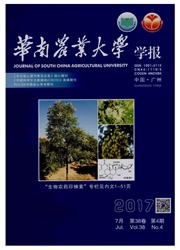

 中文摘要:
中文摘要:
为探讨自由基在山羊内毒素血症发病机理中的作用,将48只山羊随机分为4组,每组12只,分别为生理盐水对照组(sL)、内毒素组(LPS)、氨基胍保护组(LPS+AG)和氨基胍组(AG).分别在处理后第3和6h每组各宰杀6只,制备心肌组织匀浆,检测心肌中总超氧化物岐化酶(T—SOD)、铜锌超氧化物岐化酶(Gu—Zn—SOD)、锰超氧化物岐化酶(Mn—SOD)、总抗氧化能力(T.AOC)和过氧化氢酶(CAT)活性以及丙二醛(MDA)含量的变化.结果显示,内毒素血症时山羊心肌中超氧化物岐化酶(SOD)、CAT活性和T—AOC降低,MDA含量明显升高,而氨基胍保护组超氧化物岐化酶、CAT活性和T—AOC以及MDA含量与内毒素组差异显著(P〈0.05).该试验表明由于自由基的增多而引起的脂质过氧化损伤在山羊内毒素血症发病机理中起着重要的作用,氨基胍可有效拮抗脂质过氧化造成的损伤.
 英文摘要:
英文摘要:
To study the role of free radical on pathogenesis of endotoxemia in goats, Forty-eight goats were divided randomly into 4 groups of 12 goats in each group, namely normal control, LPS group, LPS + AG group, and AG group. Six goats of every group were killed at 3 and 6 h after the beginning of experiment. The changes of the total antioxidant capacity ( T-AOC ), superoxide dismutase ( SOD ), catalase (CAT) activity and the content of MDA in myocardium were detected respectively. The results showed that in goats with endotoxemia the activity of SOD, T-AOC and CAT in myocardium decreased, the content of MDA in myocardium significantly increased after LPS challenge. Compared with the LPS group the situation of aminoguanidine treatment group was significantly improved. The results indicated that, lipid peroxidation damage in the goat caused by the over-produced free radicals played an important role in the pathogenesis of endotoxemia. Aminoguanidine could effectively antagonise lipid peroxidation damage.
 同期刊论文项目
同期刊论文项目
 同项目期刊论文
同项目期刊论文
 期刊信息
期刊信息
